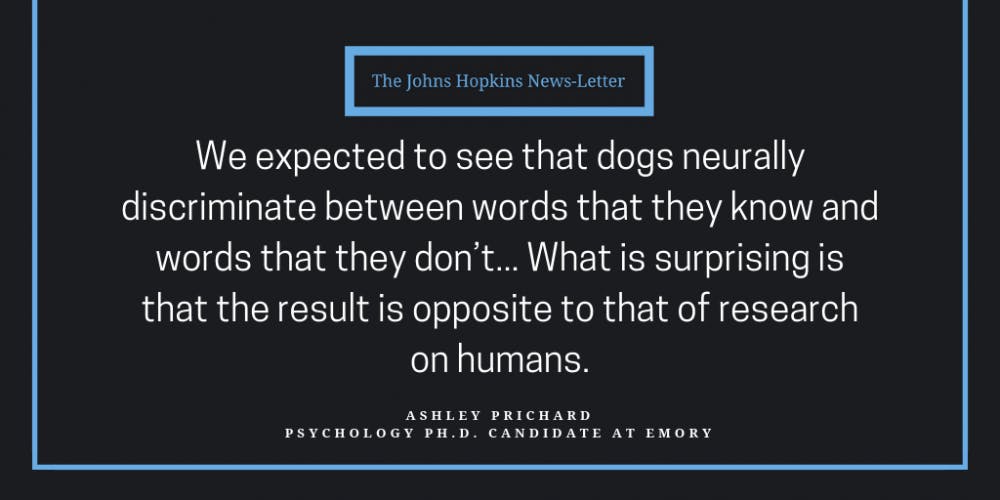Dogs are a big part of our lives. As the most commonly domesticated animal, they are called man’s (and woman’s) best friend for a reason.
Although dogs do not speak human language, they do respond to certain commands like “sit” or “wait” after some training. It is also common to find dogs who perk their ears and get excited when they hear the word “squirrel.” However, how much of our language do dogs really understand?
To explore this question, a group of scientists at Emory University conducted a study that focused on the brain mechanism of dogs and their understanding of words.
The study, presented at a seminar held at Hopkins this month, aimed to find the most effective method of communicating with dogs in order to train them more effectively for therapies or rescues.
Previously, it has been assumed that dogs have some ability to understand certain aspects of human language, but they were mainly based on observation or accounts from the dog owners. Ashley Prichard, a PhD candidate in Emory’s Department of Psychology, explained that their study was conducted to collect data from the dogs themselves, not just from the owner reports, and what they thought they’d find.
“We expected to see that dogs neurally discriminate between words that they know and words that they don’t,” Prichard said in a press release.
In order to find out, Emory researchers used a functional magnetic resonance imaging (fMRI) scanner, which allows the scientists to measure the dogs’ brain activity by tracking changes in blood flow.
The major challenge of this method was to train the dogs to voluntarily enter the scanning machine without restraint or sedation. After successfully training 12 dogs of diverse breeds to be comfortable in the fMRI environment, these dogs were then trained for several months by their owners to retrieve two distinctly different objects: one having a soft texture and another having a different texture, such as rubber, to help the dogs differentiate the two objects.
Following this process, the dogs were trained to fetch the objects by the object’s names and were rewarded with food or praise. Once a dog displayed that it could tell the two objects apart by correctly fetching the named object consistently, the training was complete. They were ready to be scanned in the fMRI.
The fMRI scannings showed that the researchers’ expectations were right. When the dogs were shown the objects they were trained with while hearing the object’s name, as opposed to being shown novel objects, such as hats, while hearing gibberish, the dogs displayed greater neural activation toward the novel words which they did not recognize.
Prichard was not expecting this result.
“What is surprising is that the result is opposite to that of research on humans — people typically show greater neural activation for known words than novel words,” Prichard said.
Gregory Berns, a senior author on the study, believes that a possible explanation for this is that the dogs try harder to understand the novel words because they sense that their owners are trying to communicate something.
“Dogs ultimately want to please their owners,” Berns said in a press release.
The researchers also observed that different dogs activated different parts of their brains, which may be due to variation in the cognitive abilities of different breeds.
This study did not, however, indicate that words are the most effective way for humans to communicate with dogs. Although words are what people often use to train their dogs, it was found in another study by Prichard and Berns, published in Scientific Reports, that dogs are more sensitive to visual and olfactory cues than verbal ones.
“From the dog’s perspective, a visual command might be more effective, helping the dog learn the trick faster,” Prichard said.





